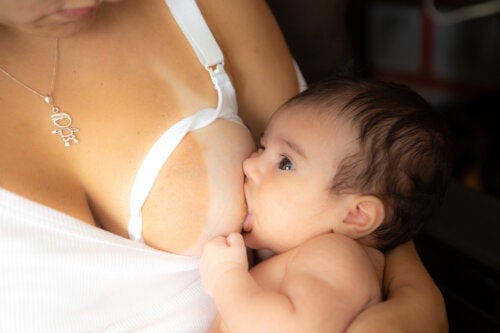The Flavor of Breast Milk During Lactation
There are several factors that may cause the flavor of breast milk to change during breastfeeding, according to each stage. Learn more.

The flavor of breast milk is mainly sweet, due to the lactose it contains. However, there are several reasons why it can take on different flavors throughout breastfeeding. Keep reading to learn more in this article.
During pregnancy, the amniotic fluid also takes on different flavors depending on the mother’s diet. For this reason, later on, when complementary feeding begins, some flavors of the foods that the mother consumes the most will be familiar. This also occurs with breastfeeding. That’s why it’s essential for the mother to eat a varied and balanced diet during pregnancy and breastfeeding.
The flavor of colostrum
Colostrum is the first milk a baby receives from the breast. It’s yellowish, dense, and provides all the nutrients the newborn needs. It has a high concentration of IgA, which is especially important for the baby’s immune system. Its taste is rather salty, due to its high sodium and chlorine content. Once the mother starts producing mature milk, around the second week, it becomes sweeter.

The flavor of breast milk due to mastitis
When there’s engorgement or mastitis, the milk becomes saltier. In these cases, some infants may not like the taste and may even reject it. However, in no case does this mean that the milk is bad, so it’s perfectly safe to drink. In fact, during mastitis or an obstruction, it’s very important to offer the baby the breast very often or to express milk in order to achieve good drainage of the breast.
The flavor of expressed breast milk
Expressed milk can have a rather sour taste on the palate because of lipase. This is an enzyme that breaks down the fat in the milk so that it’s better digested by the baby. The food takes on such a strong, sour smell and taste that it gives us the sensation that it’s spoiled. However, if you express and store it correctly and with proper hygiene, there’s nothing to worry about.
This milk can be consumed perfectly well by the baby. However, you should keep in mind that while some babies don’t mind the taste, others may reject it. Therefore, it should be scalded before freezing it.
The flavor of breast milk due to the mother’s diet
In many cases, the flavor that breast milk acquires is linked to the mother’s diet. In this regard, the woman’s diet conditions the flavors that the baby tastes. Therefore, the greater the variety of foods consumed by the mother, the wider the range of new tastes that the baby will receive.
Maintaining a balanced diet that incorporates a wide variety of foods will help the baby to become familiar with various flavors. This will enrich the child’s taste for different foods and, possibly, they’ll receive complementary feeding much better, as they’ll recognize the tastes.

Breast milk during pregnancy
When a woman becomes pregnant while breastfeeding, breast milk rapidly changes its composition. As a result, its taste also changes. Therefore, the food takes on a salty taste that’s quite noticeable and sometimes causes babies to refuse the breast. In fact, during gestation, many infants wean themselves.
Breast milk during menstruation
During menstruation, milk also changes its flavor a bit and takes on a saltier taste. While some babies don’t mind this change, others do notice it and suckle a little less for a few days. However, it’ll only be a matter of days before everything returns to normal.
Proper feeding is key
As you can see, there are many moments when the flavor of breast milk can change throughout the duration of breastfeeding. It depends on the physiological moment in which we find ourselves, as well as other external factors that we mothers can control, such as diet.

